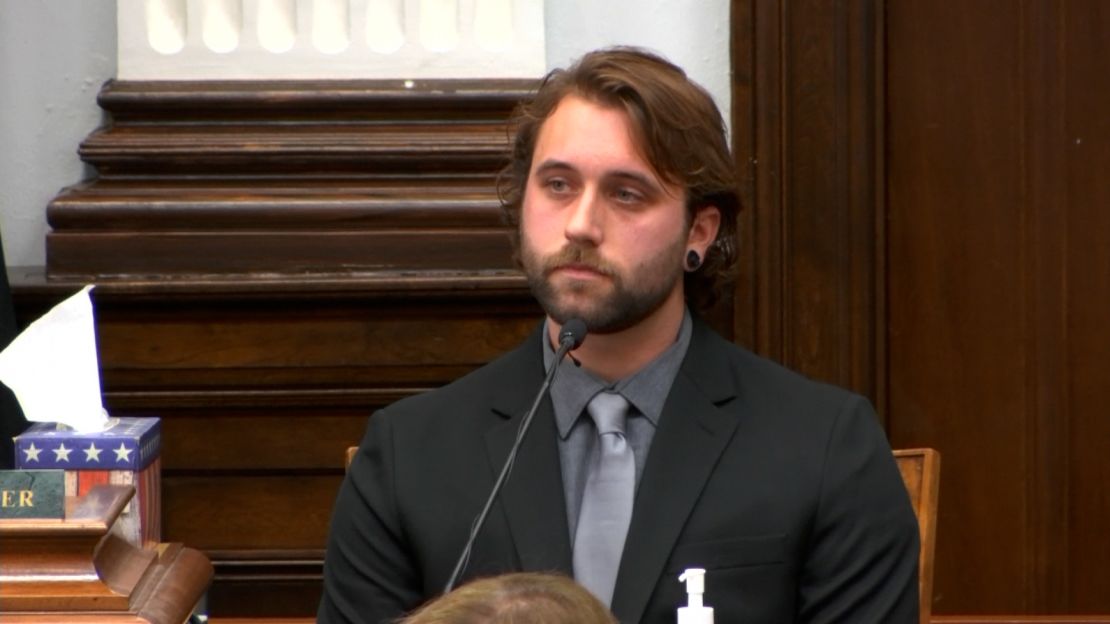An armed paramedic who was shot by Kyle Rittenhouse in Kenosha, Wisconsin, last year testified Monday that he pulled out his own firearm because he believed Rittenhouse was an active shooter.
Gaige Grosskreutz, 27, testified that he unholstered his handgun on August 25, 2020, as he and a crowd followed Rittenhouse, who had just fatally shot another man. Rittenhouse fell to the ground, fired twice at an unknown person and then fatally shot Anthony Huber.
Grosskreutz, just feet away, put his hands in the air, videos show. He then saw Rittenhouse rerack his weapon – a motion that loads it for gunfire, he testified.
“Reracking the weapon in my mind meant that the defendant pulled the trigger while my hands were in the air, but the gun didn’t fire, so by reracking the weapon I inferred the defendant wasn’t accepting my surrender,” he testified.
Yet Grosskreutz did not pull the trigger of his weapon, he said.
“I was never trying to kill the defendant. In that moment, I was trying to preserve my own life, but doing so while taking the life of another is not something I am capable or comfortable doing.”
“That’s not the kind of person I am,” he added, citing his medical training.
The testimony, delivered as prosecutors played videos of Grosskreutz’s movements that night, came at the start of the second week of trial for Rittenhouse, who fired an AR-15-style weapon eight times amid protests following the police shooting of Jacob Blake.
Rittenhouse, 17 at the time, fatally shot an unarmed Joseph Rosenbaum, 36, in a parking lot and then tried to flee. A crowd followed his movements and Rittenhouse then shot twice at an unarmed unknown individual, fatally shot an unarmed Huber, 26, and shot Grosskreutz in the arm.
Now 18, Rittenhouse has pleaded not guilty to seven charges, including first-degree intentional homicide, first-degree reckless homicide and first-degree attempted intentional homicide – the latter of which for wounding Grosskreutz.
Defense attorney Mark Richards said Rittenhouse fired only in self-defense. In opening statements, he described Rosenbaum as the aggressor in the initial incident and said Huber and Grosskreutz were part of an attacking “mob.”
The prosecution called 14 witnesses last week, including police, witnesses and armed men out in Kenosha that night.
Grosskreutz’s concealed carry license had expired

Grosskreutz testified Monday that he was a trained paramedic and helped provide first aid at about 75 demonstrations during that summer’s Black Lives Matter demonstrations in Milwaukee.
He traveled to Kenosha on August 25, 2020, by himself because he felt his medical experience and knowledge would be helpful. He wore a hat reading “paramedic” and brought medical supplies and his firearm, which he said he carried with him every day. He admitted his concealed carry license had expired and he had not renewed it.
Grosskreutz said he treated about 10 people that night, including one who had a serious cut after being hit by a rubber bullet.
At one point that night, he heard gunshots, ran toward the origin and came upon Rittenhouse, who was running down the street. “What are you doing? You shot somebody? Who’s shot?” Grosskreutz asked, video shows. Rittenhouse responded, “I’m going to the police,” the video shows, but at the time Grosskreutz believed he had said “I’m working with the police.”
Coupled with an earlier interaction with another armed man, Grosskreutz thought the comment was odd and noteworthy. He faded back a bit but continued to follow Rittenhouse down the street.
“Further inferencing from the things I had heard, experienced and witnessed earlier in the night, I thought the defendant was an active shooter,” he said.
During the ensuing confrontation, Rittenhouse shot Grosskreutz in the right bicep, he testified. He said he spent a week in the hospital and several months in physical therapy for his injury.
In cross-examination, defense attorney Corey Chirafisi pointed out that Rittenhouse fired when Grosskreutz aimed his gun at him.
“It wasn’t until you pointed your gun at him, advanced at him with your gun … that he fired,” Chirafisi said.
“Right,” Grosskreutz responded.
On redirect, he clarified that he did not intentionally aim at Rittenhouse.
“At any point during that encounter did you intentionally point your firearm at the defendant?” prosecutor Thomas Binger asked.
“No, I did not,” he responded.
In addition, Grosskreutz acknowledged he incorrectly told police last year that his firearm had fallen out of his pants that night and did not admit that he had a weapon at the time. He also said that he had only “minimal information” about Rittenhouse or his prior actions at the time of the shooting.
Officer says he pepper sprayed Rittenhouse
Also on Monday, Kenosha police Officer Jason Krueger testified that he discharged pepper spray at Rittenhouse after the teenager shot three people.
Krueger said he and his partner were responding to a call for a fire in the area when they heard gunshots. As they got closer to the vicinity of the gunshots, Rittenhouse approached the squad car with his hands in the air, Krueger testified.
Krueger commanded Rittenhouse to “keep away” and “stay back” from the car, but Rittenhouse kept walking toward police, he testified. Krueger then deployed his pepper spray at Rittenhouse, who backed away.
Krueger testified that he did not believe that Rittenhouse was surrendering.
Video taken from that night shows that Rittenhouse approached a line of police vehicles with his arms in the air, but police drove past without taking him into custody.
CNN’s Melissa Alonso, Mike Hayes, Julia Jones and Brad Parks contributed to this report.























